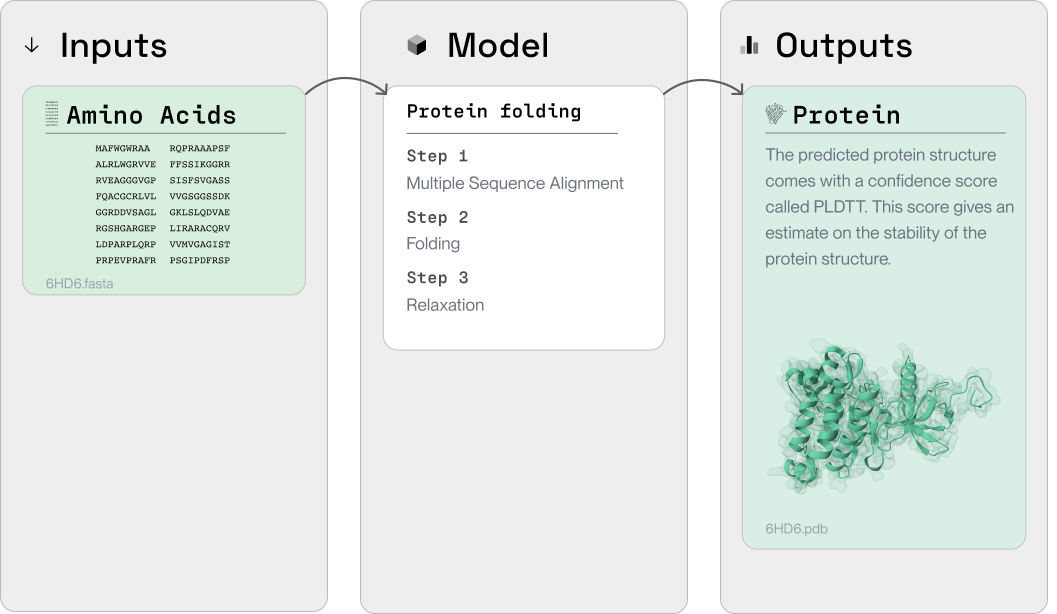Folding proteins with ColabFold
Protein folding in silico
In this tutorial, we perform protein folding with PLEX.
There are multiple reasons we believe PLEX is a new standard for computational biology 🧫:
- With a simple python interface, running containerised tools with your data is only a few commands away
- The infrastructure of the compute network is fully open source - use the public network or work with us to set up your own node
- Every event on the compute network is tracked - no more results are lost in an interactive compute session. You can base your decisions and publications on fully reproducible results.
- We made adding new tools to the network as easy as possible - moving your favorite tool to PLEX is one JSON document away.
We'll walk through an example of how to use PLEX to predict a protein's 3D structure using ColabFold. We will use the sequence of the Streptavidin protein for this demo.

Install PLEX
!pip install PlexLabExchange
Collecting PlexLabExchange
Downloading PlexLabExchange-0.8.18-py3-none-manylinux2014_x86_64.whl (26.9 MB)
[2K [90m━━━━━━━━━━━━━━━━━━━━━━━━━━━━━━━━━━━━━━━━[0m [32m26.9/26.9 MB[0m [31m20.1 MB/s[0m eta [36m0:00:00[0m
[?25hInstalling collected packages: PlexLabExchange
Successfully installed PlexLabExchange-0.8.18
Then, create a directory where we can save our project files.
import os
cwd = os.getcwd()
!mkdir project
dir_path = f"{cwd}/project"
Download protein sequence
We'll download a .fasta file containing the sequence of the protein we want to fold. Here, we're using the sequence of Streptavidin.
!wget https://rest.uniprot.org/uniprotkb/P22629.fasta -O {dir_path}/P22629.fasta # Streptavidin
--2023-08-01 21:39:21-- https://rest.uniprot.org/uniprotkb/P22629.fasta
Resolving rest.uniprot.org (rest.uniprot.org)... 193.62.193.81
Connecting to rest.uniprot.org (rest.uniprot.org)|193.62.193.81|:443... connected.
HTTP request sent, awaiting response... 200 OK
Length: 264 [text/plain]
Saving to: ‘/content/project/P22629.fasta’
/content/project/P2 100%[===================>] 264 --.-KB/s in 0s
2023-08-01 21:39:21 (144 MB/s) - ‘/content/project/P22629.fasta’ saved [264/264]
Fold the protein
With the sequence downloaded, we can now use ColabFold to fold the protein.
from plex import CoreTools, plex_create
initial_io_cid = plex_create(CoreTools.COLABFOLD_MINI.value, dir_path)
Plex version (v0.8.4) up to date.
Temporary directory created: /tmp/9ed8c638-c1b0-43da-bf92-7f054517d45c2889128719
Reading tool config: QmcRH74qfqDBJFku3mEDGxkAf6CSpaHTpdbe1pMkHnbcZD
Creating IO entries from input directory: /content/project
Initialized IO file at: /tmp/9ed8c638-c1b0-43da-bf92-7f054517d45c2889128719/io.json
Initial IO JSON file CID: QmUhysTE4aLZNw2ePRMCxHWko868xmQoXnGP25fKM1aofb
This code initiates the folding process. We'll need to run it to complete the operation.
from plex import plex_run
completed_io_cid, completed_io_filepath = plex_run(initial_io_cid, dir_path)
Plex version (v0.8.4) up to date.
Created working directory: /content/project/2ef79c16-6f59-4e44-aea7-c39db85280cb
Initialized IO file at: /content/project/2ef79c16-6f59-4e44-aea7-c39db85280cb/io.json
Processing IO Entries
Starting to process IO entry 0
Job running...
Bacalhau job id: 476d232b-e1c6-42d6-b1c0-2f4d237244b1
Computing default go-libp2p Resource Manager limits based on:
- 'Swarm.ResourceMgr.MaxMemory': "6.8 GB"
- 'Swarm.ResourceMgr.MaxFileDescriptors': 524288
Applying any user-supplied overrides on top.
Run 'ipfs swarm limit all' to see the resulting limits.
Success processing IO entry 0
Finished processing, results written to /content/project/2ef79c16-6f59-4e44-aea7-c39db85280cb/io.json
Completed IO JSON CID: QmdnjMsUar6nTqGwgjCwN1Fyjaan4i3zyht9SE9L235YRm
Viewing the results
After the job is complete, we can retrieve and view the results. The state of each object is written in a JSON object. Every file has a unique content address.
import json
with open(completed_io_filepath, 'r') as f:
data = json.load(f)
pretty_data = json.dumps(data, indent=4, sort_keys=True)
print(pretty_data)
[
{
"errMsg": "",
"inputs": {
"sequence": {
"class": "File",
"filepath": "P22629.fasta",
"ipfs": "QmR3TRtG1EWszHJTpZWZut6VFqzBPWT5KYVJvaMdXFLWXn"
}
},
"outputs": {
"all_folded_proteins": {
"class": "Array",
"files": [
{
"class": "File",
"filepath": "P22629_unrelaxed_rank_1_model_1.pdb",
"ipfs": "QmXZHhB7qP1tnJNyR2TeH7m4gB1R5UF84SzvK94eYB9qdL"
},
{
"class": "File",
"filepath": "P22629_unrelaxed_rank_2_model_4.pdb",
"ipfs": "QmPWGR36mbm5qptniHxd5KjUQKVn8EFMc57DMJzwcetNnU"
},
{
"class": "File",
"filepath": "P22629_unrelaxed_rank_3_model_3.pdb",
"ipfs": "QmXQ1F8xD3TP1qDvU1HDhpuR5JDZvxv1G2udJSdTsimKvH"
},
{
"class": "File",
"filepath": "P22629_unrelaxed_rank_4_model_2.pdb",
"ipfs": "QmV4TZJyWbu4CcmLTvD6nKM8YpzDK4fBsiiA3KQkHjW1RG"
},
{
"class": "File",
"filepath": "P22629_unrelaxed_rank_5_model_5.pdb",
"ipfs": "QmVHT7nQzmNkxDJsRTJPAFqwqhqEgmD3QBGZpUPneogVqX"
}
]
},
"best_folded_protein": {
"class": "File",
"filepath": "P22629_unrelaxed_rank_1_model_1.pdb",
"ipfs": "QmTxVHTSUr8kLa9W8yM7KUNth2pNn8m3x6M18x8yiaV2SU"
}
},
"state": "completed",
"tool": {
"ipfs": "QmcRH74qfqDBJFku3mEDGxkAf6CSpaHTpdbe1pMkHnbcZD",
"name": "colabfold-mini"
}
}
]
The output is a JSON file with information about the folded protein structures. This can be used for further analysis, visualization, and more.